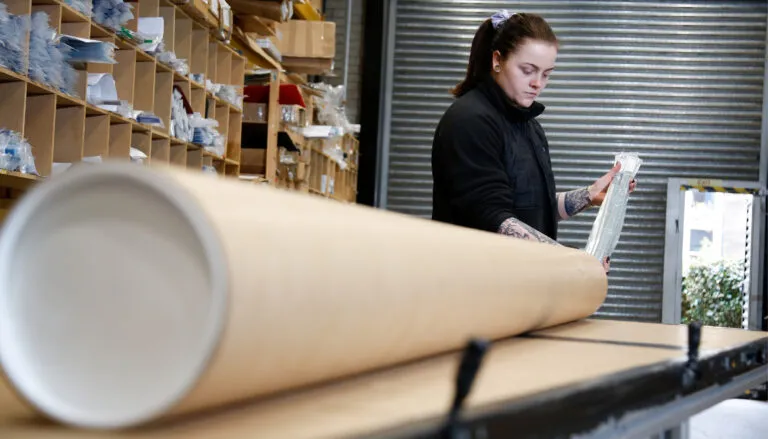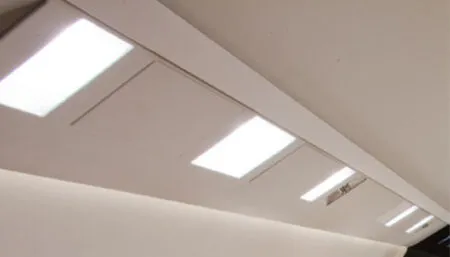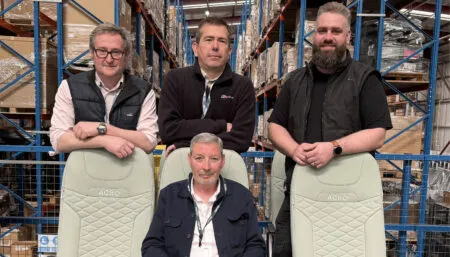Aircraft lighting specialist STG Aerospace has worked with packaging supplier Priory Direct to find a sustainable packaging solution for its new eco-focussed emergency exit marking product. STG reports that the result almost halves the weight and cost of the product’s packaging through material optimisation.
STG launched its first sustainability-focussed emergency floor path marking system in May 2024. The lighting strips, installed in an aircraft’s aisle, illuminate the way to the exit. STG’s products use photoluminescent technology, which is naturally rechargeable, and the company shares that its new saf-Tglo eco E1 is made from recycled materials, is solvent free and with no ‘forever plastics’, due to a biodegradable additive. The product is packaged in 2m lengths at 11mm wide, an awkward shape for packaging. They are dispatched across the globe, so packaging must meet local and aerospace sector packaging regulations and standards, as well be as robust as possible to protect the product in transit.
STG’s production design engineer Ryan Vincent led the project to source new packaging. “We had a packaging solution for our existing floor path marking range, which are the same dimensions,” said Vincent. “A review highlighted the need to improve its environmental impact, which didn’t align with the purpose of our new eco product.”
“The packaging came in long, heavy, cylindrical tubes made of cardboard reinforced with a layer of plastic and with plastic end caps,” Vincent continued. “The tubes, which were more than an inch thick, had a large diameter and, when empty, weighed around 7kg or 8kg. It was clear that we needed to find a more sustainable packaging solution for our new eco product, however, it still needed to be robust enough to keep our product safe and secure.”
STG shared that using oversized packaging is heavier, requires more filler materials and takes up more space in transit, all of which come with a higher environmental footprint and cost. STG’s packaging solution also needed to be more than just sustainable. It needed to be resilient and able to securely hold large quantities of floor path marking, as they are shipped across the world and potentially stored for long periods of time, before being installed.
Vincent engaged Priory Direct, a certified B Corp that supplies sustainability-focussed packaging to more than 21,000 businesses. Representatives came to the STG HQ in Cwmbran to assess the product and supply chain. The team spent the next few months working through a rigorous process to design prototypes and test several possible solutions, mostly cardboard based, including boxes.
“Our first solution was a flat cardboard wrap that is folded around the product to make it robust and also prevent it from rolling,” said Gordon Leer, sustainable packaging consultant at Priory Direct. “We also proposed a telescopic box option, for which two separate parts fit snugly together. However, due to the unique requirements of STG neither was suitable, so we reverted to the cylindrical tube shape and substantially reduced the volume and environmental footprint of the materials used.”
“It was a useful reminder that sometimes it’s not about reinventing the wheel but working to optimise the existing solution as much as possible,” said Leer. “Whilst from a business perspective this means we are ‘selling’ less material, we are supporting our client to reduce their packaging impact on the environment, which is our underlying mission as an organisation.”
“Working with STG was refreshing because where often we work with limited information to design our solutions, STG sent us detailed drawings and specifications that needed to be met, which made it much easier for us to be precise,” Leer added.
Priory Direct developed a bespoke design fully customised to STG’s product, without any use of plastic and with a 4kg weight reduction. This lighter packaging is also much easier to handle and carry, as well as being made of 100% recycled material and 100% recyclable. STG said that removing plastic and using sustainably sourced materials also reduces the administrative burden around international packaging regulations and the packaging is also certified to international environmental standard ISO 14001.
“Recyclability was important to us, because we cannot control what happens to the packaging once it leaves our warehouse,” said Vincent. “By ensuring it is 100% recyclable we know that wherever it ends up, even in landfill, it will ultimately break down, just like the eco product it was designed to protect. Because this packaging is so much better for the planet and our budget, we’ve moved our entire floor path marking range into the sustainable packaging.”
Priory Direct and STG are currently collaborating on a sustainable packaging solution for the aerospace supplier’s LED cabin lighting systems range too.





